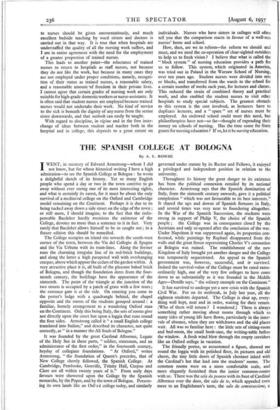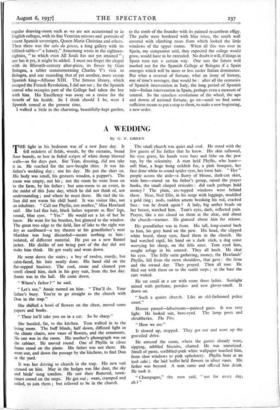THE SPANISH COLLEGE AT BOLOGNA
By A. L. ROWSE
I WENT, in memory of Edward Armstrong—whom I did not know, but for whose historical writing I have a high admiration—to see the Spanish College at Bologna : he wrote a delightful sketch of its history. Yet so many English people who spend a day or two in the town contrive to go away without ever seeing one of its most interesting sights, and what is certainly its rarest, for it must be about the only survival of a mediaeval college on the Oxford and Cambridge model remaining on the Continent. Perhaps it is due to its being tucked away down a side street on the edge of the town ; or still more, I should imagine, to the fact that the indis- pensable Baedeker hardly mentions the existence of the College, devotes no more than a sentence to it in fact. Very rarely that Baedeker allows himself to be so caught out ; in a future edition this should be remedied.
The College occupies an island site towards the south-west corner of the town, between the Via del Collegio di Spagna and the Via Urbana with its tram-lines. Along the former runs the charming irregular line of its red-brick buildings, and along the latter a high parapeted wall with overhanging creeper, above which appear the cedars of the garden within. A very attractive place it is, all built of the pleasant baked brick of Bologna, and though the foundation dates from the four- teenth century, the buildings have the appearance of the sixteenth. The point of the triangle at the junction of the two streets is occupied by a patch of grass with a few trees ; the entrance gate is at the side. On entering you come to the porter's lodge with a quadrangle behind, the chapel opposite and the rooms of the students grouped around : a familiar, homely arrangement to a wandering Oxford man on the Continent. Only this being Italy, the sets of rooms give not directly upon the court but upon a loggia that runs round the four sides. Armstrong called it " a small English college translated into Italian," and described its character, not quite correctly, as " in a manner the All Souls of Bologna."
It was founded by the great Cardinal Albornoz, Legate of the Holy See in these parts, " soldier, statesman, and an administrator of the first order," in the fourteenth century, heyday of collegiate foundations. " At Oxford," writes Armstrong, " the foundation of Queen's precedes, that of New College shortly followed, the Spanish College. At Cambridge, Pembroke, Gonville, Trinity Hall, Corpus and Clare are all within twenty years of it." From early days favours were showered upon the College by the Spanish monarchs, by the Popes, and by the town of Bologna. Possess- ing its own lands like an Oxf-1,1 college today, and similarly governed under statute by its Rector and Fellows, it enjoyed a privileged and independent position in relation to the university.
Throughout its history the great danger to its existence has been the political connexion entailed by its national character. Armstrong says that the Spanish domination of Italy, from the sixteenth century onwards, gave it a political complexion " which was not favourable to its best interests." It shared the ups and downs of Spanish fortunes in Italy, and several times was very near to foundering altogether. In the War of the Spanish Succession, the students were strong in support of Philip V, the choice of the Spanish people ; the College was in consequence closed by the Austrians and only re-opened after the conclusion of the war. Under Napoleon it was suppressed again, its properties con- fiscated, while paintings by Raphael disappeared from the walls and the great fresco representing Charles V's coronation at Bologna was ruined. The establishment of the new Kingdom of Italy brought yet another danger and the College was temporarily sequestrated. An appeal to the Spanish government was, however, successful, and it• survived. Indeed the survival-value of the College must be rated extra- ordinarily high, one of the very few colleges to have come down to us substantially as it was founded in the Middle Ages—Denifle says, " the solitary example on the Continent."
It has survived to undergo yet a new crisis with the Spanish Civil War. For on its outbreak, in July last year, all the eighteen students departed. The College is shut up, every- thing well kept, neat and in order, waiting for their return. (Who of them will return ? I wondered.) There is always something rather moving about rooms through which so many tides of young life have flown, particularly in the inter- vals of absence, when they are withdrawn and the old places wait. All was so familiar here : the little sets of sitting-room and bed-room, the small book-case, the writing-table before the window. A fresh wind blew through the empty corridors like an Oxford college in vacation.
The friendly porter, so accustomed a figure, showed me round the loggia with its polished floor, its pictures and old chests, the tiny little doors of Spanish chestnut inlaid with the Cardinal's hat that lead into the students' rooms. The common rooms were on a more comfortable scale, and more elegantly furnished than the junior common-rooms with us. There was the sala da pranzo with its bust of Cardinal Albomoz over the door, the sala da te, which appealed even more to an Englishman's taste, the sala da conversazione, a regular drawing-room such as we are not accustomed to in English colleges, with its fine Venetian mirrors and portraits of recent Spanish sovereigns, Queen Maria Christina and others. Then there was the sala da giocco, a long gallery with its billiard-table7-" a luxury," Armstrong wrote in the eighteen- eighties? " to which even All Souls has not yet attained " ; nor has it yet, it might be added. I must not forget the chapel with . its fifteenth-century altar-piece, its fresco by Gian Bologna, a tablet commemorating Charles V's visit to Bologna, and one recording that of yet another, more recent Spanish king—Alfonso XIII. The famOus library, which escaped the French Revolution, I did not see ; for the Spanish consul who occupies part of the College had taken the key with him. His Excellency was away on a cruise for the benefit of his health. So I think should I be, were I Spanish consul at the present time.
I walked a little in the charming, beautifully-kept garden, to the tomb of the founder with its painted recumbent effigy. The paths were bordered with blue irises, the south wall covered with climbing roses from which looked the little windows of the upper rooms. When all this was over in Spain, my companion said, they expected the college would grow, would have to be extended. No doubt it will, if things in Spain turn out a certain way. One sees the future well marked out for the Spanish College at Bologna if a Spain emerges which will be more or less under Italian dominance. But what a reversal of fortune, what an irony of history, one of time's revenges, that would be : after all the centuries of Spanish intervention in Italy, the long period of Spanish rule—Italian intervention in Spain, perhaps even a measure of control. So the senseless revolutions of the wheel, the ups and downs of national fortune, go on—until we find some sufficient means to put a stop to them, to make a new beginning, a new order.







































 Previous page
Previous page